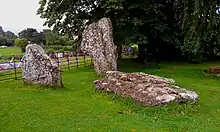
The cove at Stanton Drew
A cove is a tightly concentrated group of large standing stones found in Neolithic and Bronze Age England. Coves are square or rectangular in plan and seem to have served as small enclosures within other henge, stone circle or avenue features. They consist of three or four orthostats placed together to give the impression of a box. An opening between the stones, oriented south east, is also a feature.
They may have developed from the elaborate facades that fronted Neolithic long barrows, although their original function is unknown.
Examples include:
- The Longstones in Wiltshire;
- The cove at Avebury Henge in Wiltshire;[1]
- The cove at Stanton Drew in Somerset[2] and
- The cove at Mount Pleasant henge in Dorset
See also
References
- ↑ Historic England. "Avebury Long Stones (1008104)". National Heritage List for England. Retrieved 11 September 2015.
- ↑ "Stanton Drew Circles and Cove". English Heritage. Retrieved 29 March 2016.
External links
- Coves, structural enigmas of the Neolithic – Wiltshire excavation report, 2000, Southampton University; archived June 2004
This article is issued from Wikipedia. The text is licensed under Creative Commons - Attribution - Sharealike. Additional terms may apply for the media files.